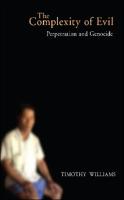The Complexity of Evil
Perpetration and Genocide
| dc.contributor.author | Williams, Timothy | |
| dc.date.accessioned | 2022-01-15T05:31:25Z | |
| dc.date.available | 2022-01-15T05:31:25Z | |
| dc.date.issued | 2020 | |
| dc.identifier | OCN: 1198612135 | |
| dc.identifier.uri | https://library.oapen.org/handle/20.500.12657/52460 | |
| dc.description.abstract | Why do people participate in genocide? The Complexity of Evil responds to this fundamental question by drawing on political science, sociology, criminology, anthropology, social psychology, and history to develop a model which can explain perpetration across various different cases. Focusing in particular on the Holocaust, the 1994 genocide against the Tutsi in Rwanda, and the Khmer Rouge genocide in Cambodia, The Complexity of Evil model draws on, systematically sorts, and causally orders a wealth of scholarly literature and supplements it with original field research data from interviews with former members of the Khmer Rouge. The model is systematic and abstract, as well as empirically grounded, providing a tool for understanding the micro-foundations of various cases of genocide. Ultimately this model highlights that the motivations for perpetrating genocide are both complex in their diversity and banal in their ordinariness and mundanity. | |
| dc.language | English | |
| dc.subject.classification | thema EDItEUR::J Society and Social Sciences::JP Politics and government::JPV Political control and freedoms::JPVH Human rights, civil rights | en_US |
| dc.subject.other | Political Science | |
| dc.subject.other | Human Rights | |
| dc.title | The Complexity of Evil | |
| dc.title.alternative | Perpetration and Genocide | |
| dc.type | book | |
| oapen.relation.isPublishedBy | 111d1c48-fc70-44ba-97fa-39be459ee343 | |
| oapen.relation.isFundedBy | b818ba9d-2dd9-4fd7-a364-7f305aef7ee9 | |
| oapen.relation.isbn | 9781978814332 | |
| oapen.collection | Knowledge Unlatched (KU) | |
| oapen.imprint | Rutgers University Press | |
| oapen.identifier | https://openresearchlibrary.org/viewer/1e0e830b-3c87-4a84-a563-5790a6aa333f | |
| oapen.identifier.isbn | 9781978814332 | |
| grantor.number | 104973 |

